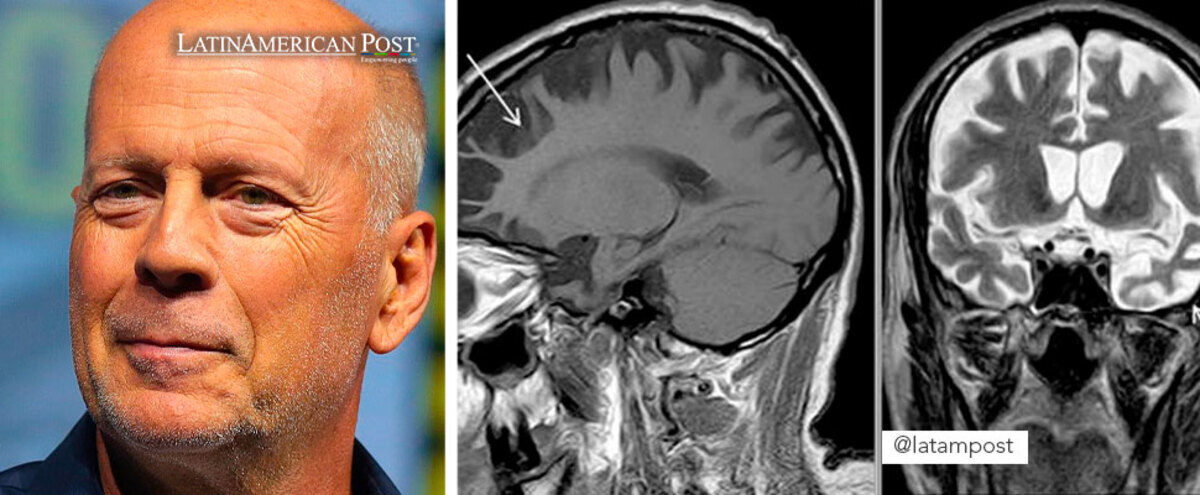What is Frontotemporal Dementia?
Frontotemporal dementia is a type of dementia that affects specific areas of the brain and can develop in people under the age of 60. We tell you what its symptoms are and how to detect it.

Photo: Gage Skidmore
LatinAmerican Post | María Fernanda Ramírez Ramos
Listen to this article
Leer en español: ¿Qué es la demencia frontotemporal?
Frontotemporal dementia (FTD) is a term used to describe a group of disorders that affect the brain. It occurs because there is an accumulation of substances and proteins that attack neurons in the frontal and temporal lobes. These two brain areas relate to personality, emotions, behavior, comprehension, and language. Therefore, it affects the behavior of people.
Recently, this disease has given rise to talk since it has been confirmed that actor Bruce Willis, 67, suffers from it. However, it is a rare type of dementia. Despite this, the World Health Organization has stated that there is growing concerned about the increase in cases of different kinds of dementia worldwide. "With a global estimate of 55 million people living with this medical condition, this neurological disorder is ranked as one of the top ten leading causes of death worldwide and is the third leading cause of death in the Americas. As of 2019, 10.3 million people were reported to be living with dementia in the Americas, costing the region an estimated US$379 billion," notes the Pan American Health Organization PAHO.
We recommend you read: Aging or Alzheimer's? How to differentiate and identify them
What are the Symptoms of Frontotemporal Dementia?
Frontotemporal dementia can manifest through multiple symptoms. The most frequent are alterations in conduct and behavior. Thus, it can display a loss of interest and motivation for daily activities or sudden changes in behavior with compulsive activities, such as walking for hours in the same place without much sense. Other symptoms may be related to aggressiveness or lack of empathy. "Loss of empathy and sensitivity towards the feelings of others. The patient is unable to interpret or imagine the emotions of others," says Clínic Barcelona.
Likewise, there are usually alterations in language. People may have difficulty understanding words, making sense of what they hear, and speaking. You may start having difficulty pronouncing or forming coherent sentences.
On the other hand, there are usually motor difficulties, that is, physical inconveniences in doing certain activities, for example, falling frequently, having stiffness in the body, or feeling that the body does not respond to the "orders" that are given.
It usually affects people between the ages of 45 and 64. However, FTD can also affect younger or older people, according to the UK Alzheimer's Research Centre.
Why Does Frontotemporal Dementia Appear?
It is estimated that between 10% and 30% of cases of this type of dementia are hereditary. In other words, a risk factor is having people in the family who have already suffered from FTD.
Various studies have studied whether smoking, diabetes, thyroid dysfunction, or a poor cardiovascular condition influence the development of this disease. However, the results have not been conclusive. On the other hand, there are still significant gaps about why the proteins that attack the lobes of the brain develop. The UK Alzheimer's Research Center points out that as it is a rare disease, there are difficulties in its investigation to determine the causes. However, they point out that to reduce the risk of any type of dementia, it is necessary to take care of brain health. This includes not smoking, watching your cholesterol, exercising, maintaining a healthy weight, and not overindulging in alcohol.
What is the Treatment for Frontotemporal Dementia?
Today there are no specific treatments to cure this disease. So the patient is accompanied by speech or behavioral therapies. Regarding medication, each case is studied individually since there is no specific type of medication for FTD. "Medications used to treat or delay Alzheimer's disease do not appear to work for people with frontotemporal dementia, and some may worsen symptoms of this condition," the Mayo Clinic notes.
Those with frontotemporal dementia may have changes in behavior and mood, which can be challenging to assimilate. Finally, it should be noted that for families that have a member with this disease, it is advisable to seek psychological and emotional support. Likewise, organizations such as the Association for Frontotemporal Degeneration promote research and create support networks.




